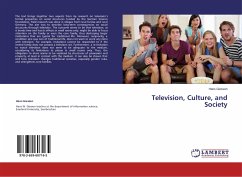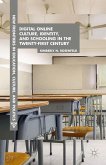The text brings together two aspects from my research on television s formal properties on social structures funded by the German Science Foundation. Field research was done in villages from rural Tunisia and rural Germany. The aim was to describe long-term consequences on social structures through television. The outcome seems to be that television, as it bonds time and has its effects in small rooms only, might be able to focus attention on the family or even the core family, thus destroying larger institutions that are typical for traditional life. Moreover, reciprocity, a condition sine qua non of traditional life, does not seem to work any more with television. For example, invitations cannot be responded to if the invited family does not possess a television set. Furthermore, a re-invitation to watch television does not seem to be adequate to the medium, considering its limitations to please in small rooms only. Thus, the obligation to share seems to be replaced by structures of possession and property, at least in context with the medium. It can also be shown that and how television changes traditional societies, especially gender roles, and strengthens core families.
Bitte wählen Sie Ihr Anliegen aus.
Rechnungen
Retourenschein anfordern
Bestellstatus
Storno








